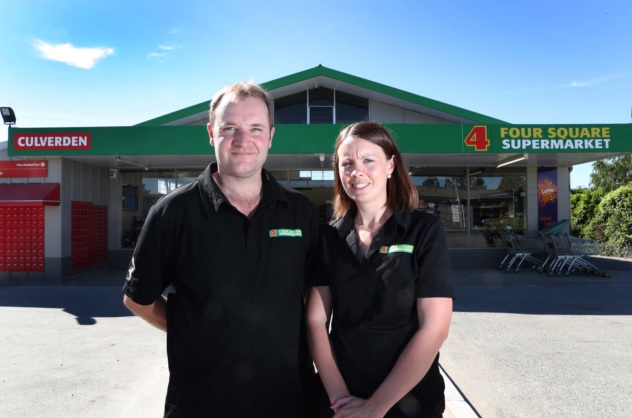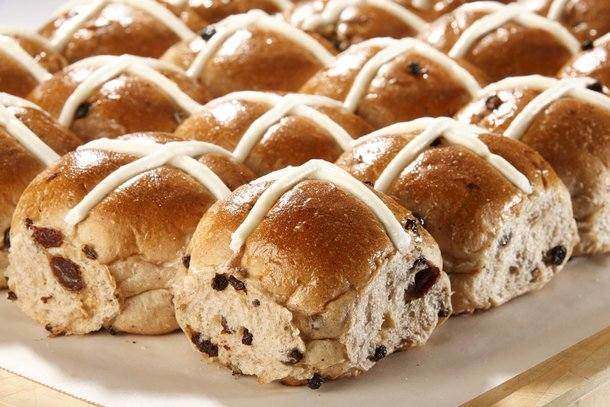
In an emergency, the local supermarket becomes the centre of activity as people stream in to get urgent supplies like baby formula and bottled water – and to connect with their friends and neighbours. One year on from the Kaikoura earthquake, we asked the people who run the supermarkets in the region to reflect on the experience.
When the Kaikoura earthquake hit just after midnight on November 14, 2016, Andrew and Kelly Whittleston were the new owner-operators of the Culverden Four Square.
“We’d only been in this business for two weeks when the earthquake hit,” Kelly says. “Andrew was still getting his head around ordering and then he had that thrown at him and normal orders went out the window. Andrew coped really well and we got through.”
“At the time, it was disorienting – it felt like a truck drove into the house,” Andrew says. “Our house is on poles so it just swayed with the movement. We were lucky that our house wasn’t damaged. Overall, Culverden had very little damage, but we seemed to get a lot of media attention at the time. We were a hub for supplies being dropped off here by the army.”
“Our staff came in to help clear up the mess and it was all under control by the time the fire brigade arrived,” Kelly says. “We were pretty lucky to be open so quickly. It really became clear to us that the community needs you. The store becomes a place for people to come and tell their stories. They want to talk to people and connect – particularly the elderly or those who live on their own.
“It certainly showed us what a great community we had moved into. Everyone was so supportive from our staff, the local fire brigade, the school and through to the council. Everyone worked together,” Kelly says. “In a way, it was nice to be busy. It didn’t sink in until a few days later.”

Supermarkets are in the blood for Kelly’s family. Her brother Glen Steele owns the New World in Kaikoura and was also busy dealing with the effects of the earthquake. “We were lucky that Mum and Dad [who live in Hanmer Springs] could take our three kids and Glen’s two kids as well,” Kelly says. “The adrenaline takes over. You manage to work big days on very little sleep.
“If there’s a silver lining, it’s that we got to meet everyone really quickly. An event like this really brings people together.”
With endless road closures on State Highway 1, the main road to Kaikoura is now the inland route, which takes the traffic through Culverden.
“There’s a lot more traffic, but I’m not sure that that means more business for us,” Andrew says. “People don’t necessarily stop on their way through. But we were so new here when the earthquake hit that it’s really all we’ve ever known. We won’t really know what’s normal until the roads are open.”
“The increased traffic is keeping the emergency services busy, unfortunately. There are a lot more crashes. There are lots of trucks on the road now, and the school’s on the other side so it’s a mission to get the kids across,” Kelly says.
“This has easily been the most stressful year of our lives so far. Before, we were working for wages, and now we’re responsible for a business and a community of locals as well as our family,” Andrew says.
“We had a large amount of our stock ending up broken on our floor but that aside we were pretty fortunate compared to many others in the area. We were open by about 9.30am and power was restored at about 10am,” Kelly says. “It was a rough few weeks which I would never want to relive but we figure if we can get through that we can get through anything.”
Locals helping each other out
Glen and Mel Steele had been the owner-operators at New World Kaikoura for a year before the earthquake hit. Prior to that, they’d been at the Four Square in Hanmer Springs.
Glen says: “The first couple of weeks are a bit of a blur. Everyone just did what they had to do.”
“It was a long day, from when the earthquake woke us up at midnight, to having the engineer here on the Monday and then getting access to the store at 4pm that afternoon. We were open at 8am on the Tuesday,” Mel says. “In the first few hours we had no communication. We knew that Foodstuffs had organised an engineer to come on a chopper, but with no communication we just had to drive around looking for the right chopper with an engineer on it. There were heaps of choppers landing at different sites around town.”
“To begin with, we cleared an area around the checkouts and let people into that small area. There was a queue out the door, about 50 metres long. We just did our best to help people. Someone would ask ‘Have you got any…’ and someone would go and look for it. We were selling the basics – a lot of water, infant formula, bleach and nappies,” Glen says.
“Locals came in offering to help. They’d be packing groceries for other people,” Glen says. “Everyone got stuck in and did what they needed to do. Everyone wanted to help and our staff worked massive hours. People were running on adrenaline. We had to tell people to take their days off and stay home.
“We spent the first few days cleaning, taking down broken shelves and rebuilding shelving. We slowly increased the area of the store that was shop-able. When we didn’t have shelves, we began by using shopping trolleys and pallets. We’d stack product in the trolleys and line them up, and these became like aisles for people to shop from,” Glen says.
“Nothing came by road for the first week, but we got special deliveries from some of our suppliers. Ewing Poultry sent two deliveries of eggs by helicopter. Hellers sent us their products by helicopter and another delivery by boat, and Harris Meats sent several deliveries by plane. Word would get out that a delivery of meat had arrived and customers would come in to get some,” Glen says.
“After three days the adrenaline wore off, and then we needed the tissues. People still hadn’t showered. They were feeling uncertain about the future of the town,” Mel says.
“When they managed to get a Whale Watch boat out, and they saw whales out there, people felt better. That gave everybody hope that we’d still have a tourism industry,” Mel says.
“We didn’t get our water clearance until December 23. We couldn’t do any food preparation in store until we had that, so our service deli was closed for a long time. It was only in mid-December that we got clearance to bake using bottled water,” Glen says.
Mel says: “It was payday when the quake happened, so I worked with head office to make sure that people still got paid. The bank flew in change for us, and flew our cash out again.”
There was a larger-than-usual military presence in New Zealand that week, for the 75th celebrations of the New Zealand Navy. The USS Samson, the Australian frigate HMAS Darwin and the Canadian frigate HMCS Vancouver were diverted to Kaikoura to help. Between them, the Samson, Darwin and Vancouver had four helicopters which were used to ferry supplies and people around the region. The New Zealand Navy sent HMNZS Canterbury, HMNZS Wellington, HMNZS Te Kaha and HMNZS Endeavour.
“It was a bit like MASH, with the frigates in the harbour and so many helicopters buzzing around,” Mel says. “The armed forces were brilliant. We had some Canadian guys come and fix our roller doors.
“We lost a couple of staff who left town, and a few who’ve chosen to go and work on the roads. It’s a struggle now to find new staff. There’s a shortage of accommodation, so even if we were to recruit from other areas, there’s nowhere for them to stay. With the busy Christmas period approaching, staffing will be a real challenge,” Glen says.



